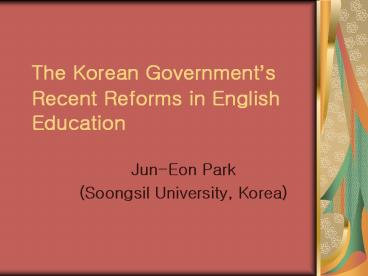The Korean Governments Recent Reforms in English Education
1 / 25
Title: The Korean Governments Recent Reforms in English Education
1
The Korean Governments Recent Reforms in English
Education
- Jun-Eon Park
- (Soongsil University, Korea)
2
I. Present situation
- 1. Low level of English proficiency
- In 2005, Korea ranked 16th among 32 Asian
countries, and 93rd among 227 countries in TOEFL
3
Table 1. TOEFL scores
(ETS, 2005)
4
- 2. Sharp discrepancy between communicative
skills and reading grammar skills - Spoken English ability is ranked 105th among 108
countries. (ETS, 2001
5
Table 2. Speaking test score
6
- 3. Rapid increases in private tutoring and early
study abroad - 1) Exponential increase of cost for early study
abroad exodus
7
Table 3. Annual cost for study
abroad
8
- 2) Aggravating English Divide
- Urban high income families spend more money for
private English education than rural low income
families.
9
Table 4. Regional gaps in students
achievement levels (2004)
10
II. Analysis of the Problems
- 1. Discrepancy between public English education
and social demands on communicative English - - Companies consider communicative proficiency
as the most important factor in recruiting new
employees. - - English proficiency level affects the salary
and promotion of employees
11
- 2. Failure of public English education system to
meet social demand on communicative proficiency
due to restricting factors - - large class size,
- - lack of proficient English teachers,
- - lack of English using environments, etc.
12
Table 5. Percentage of English
teachers who can teach English in English
13
- 3. Limited exposure to English
- Learning and using English outside the school
environment is very limited
14
Table 6. National differences in English
education in schools
15
III. Reform Moves
- Goal
- - Substantial improvement in English teachers
proficiency by 2010 - - Gradual increases of NES teachers by 2010 and
decreases of them after 2010
16
- 1. Securing proficient English teachers
- 1) Intensive retraining of in-service English
teachers - - Intensive long-term retraining (6 months 1
year) of 1,000 English teachers annually until
2015 - - Providing customized retraining programs for
English teachers - 2) Compulsory participation in English retraining
programs at 5 year interval
17
- 2. Upgrading the standards for recruiting English
teachers - - Reforms of English teacher recruiting exams
- 1st part English listening
- 2nd part English essay
- 3rd part simulated test in teaching English in
English
18
- 3. Renovating pre-service English teacher
education system - - Renovation of curriculum in teachers colleges
focusing on improving English proficiency and
teaching skills - - Shift of curriculum from academic-based one to
skill-based one - - Encouraging English lectures in all courses
- - Hiring more NES lectures in teachers colleges
19
- 4. Improving NES teacher recruiting and
management processes - - Diversifying the sources of NES teachers
- - Utilizing ethnic Koreans living in
English-speaking countries - - Recruiting teachers from English-speaking
countries with teacher credentials - - Systematic management and retraining of NES
teachers - - Continued hiring of NES teachers in schools
20
Table 7. Numbers of recruited NES teachers
21
- 5. Strengthening communicative English education
- 1) Curricular reinforcement
- - Extending elementary school English education
to 1st and 2nd grades - - Increasing class hours in elementary school
English education - 2) Improving the quality of English textbooks
- - Multimedia-based, activity-based textbook
development
22
- 3) Implementing English immersion education in
special regions free economic zones, Jeju
Special Self-governing Province, etc. mainly
math and science - - Gradual nationwide diffusion of immersion
English education - 4) Introducing national-level English proficiency
assessment system. - - Establishing national English proficiency
assessment agency in 2007
23
- 6. Reducing English Divide
- 1) Establishing so-called English experience
area in individual schools - 2) Operating satellite TV channels for English
learning purposes - 3) Utilizing Internet portal sites for English
learning purposes - - Developing e-learning contents
- - Providing English learning contents for DMB,
MP3 users
24
IV. Concluding Remarks
- The Korean governments recent reforms in English
education are the belated responses to the harsh
criticisms of the public and private sectors that
the current English education system has failed
to produce proficient English users. - To remedy the high cost, low efficiency
problems prevailing in English education, the
Korean government has started to make all-out
efforts to renovate the whole system of English
education. If all the reform measures are carried
out successfully as planned, the future of
English education in Korea is expected to be much
brighter than now.
25
- Thank you for your listening.
- ?????.

